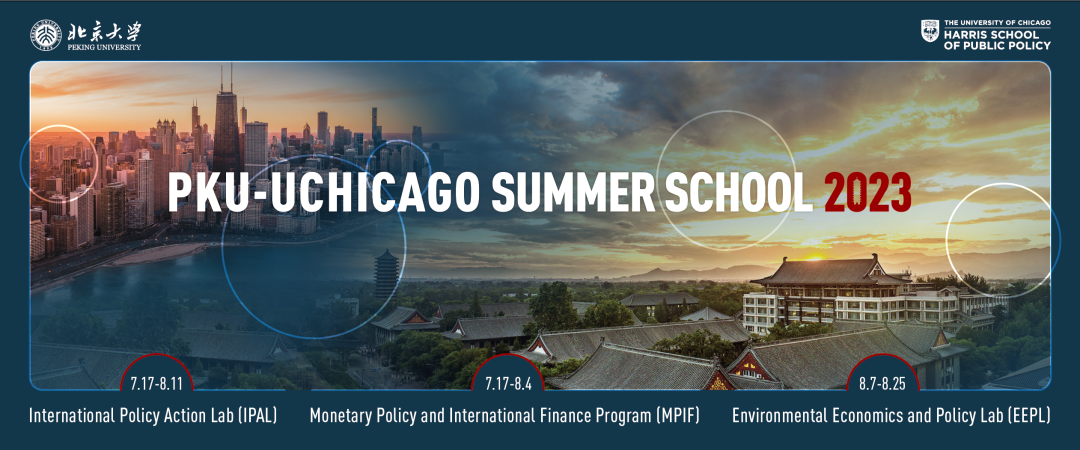
Peking University and the University of Chicago have a long and well-established history of cooperation and exchange as strategic partners. In 2019, Peking University Chicago Center was registered in the US, making it the first overseas centre established by Peking University. As an important platform for Peking University's external exchanges, the center actively explores new modes of spreading education methods all over the world and promotes cooperation between Peking University and universities in North America in various aspects such as talent training, research exploration and humanistic exchanges.
After three years of online teaching and careful preparation, Peking University and the University of Chicago will launch an offline "Peking University-University of Chicago Joint Summer School" (hereinafter referred to as "Summer School") in the summer of 2023. During the Summer School, you will receive face-to-face instruction and guidance in English from top professors in UChicago or PKU on PKU campus, complete a group research project supervised by professors, visit top industry organizations to learn about their best practices, receive career planning advice and social networking from top practitioners in related fields in China and the United States, and receive a certificate of completion jointly awarded by the Harris School of Public Policy at the University of Chicago and Peking University.
This year's Summer School offers three separate full English language programmes focusing on: International Policy Action Lab (IPAL), Monetary Policy and International Finance Program (MPIF), and Environmental Economics and Policy Lab (EEPL). The programmes offer an interdisciplinary academic experience and a rich alumni and professional network for leading students and working professionals from around the world. The programme is now open for applications! Please scan the QR code at the end of the article to access the Project Advisory WeChat Group of the programme and receive further information on specific programme briefings.
Course I:International Policy Action Lab, IPAL
Duration:17 July 2023 -11 August 2023
The International Policy Action Lab (IPAL) provides an interdisciplinary academic experience for leading students and working professionals from around the world through popular research questions, professional faculty and an effective community network. With the ideal of exploring the logic of international social policy development, participants will be trained in rigorous data analysis and social science research methods through three courses. They will also learn evidence-based methods for conducting international policy research, and complete the Capstone Research Project, a group research project supervised by University of Chicago faculty. Research discussions and post-course community activities allow students to have a more multidimensional collision of thinking in a communicative and interactive way.
Faculty:
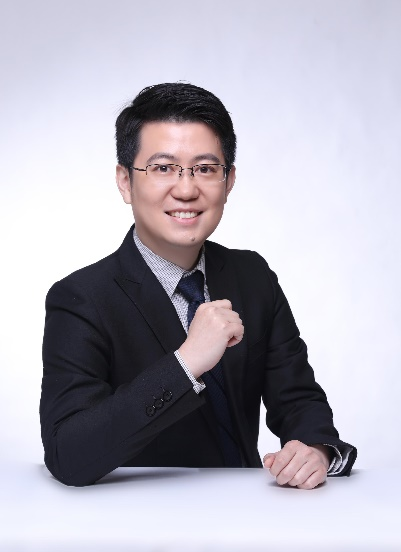
Xuezheng Qin, School of Economics, Peking University, Deputy Dean, Professor
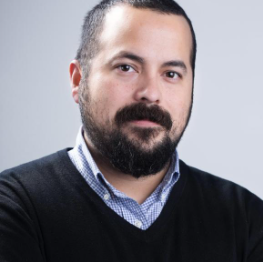
Austin Wright, Harris School of Public Policy, University of Chicago, Assistant Professor
Dr. Wright is an Assistant Professor at the University of Chicago Harris School of Public Policy and a faculty affiliate of the Pearson Institute for the Study and Resolution of Global Conflicts. His research leverages micro-level data to study the political economy of conflict and crime in Afghanistan, Colombia, Indonesia and Iraq, Wright's work is supported by the National Science Foundation, Niehaus Center for Globa Governance, the Asia Foundation, and the World Bank.
For the academic year 2021-2022, Wright is on leave and also a Visiting Assistant Professor at the Yale University School of Management and a faculty affiliate of the Georg Walter Leitner Program in International and Comparative Political Economy.
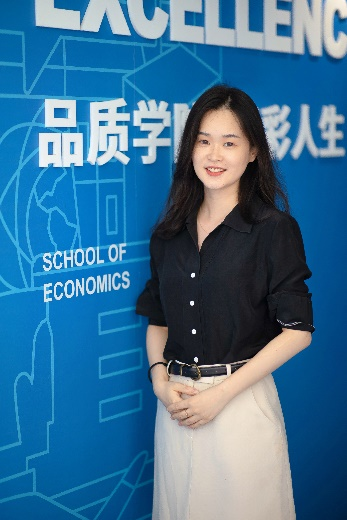
Yanran Chen
Yanran Chen obtained PhD degree from Peking University and a joint PhD degree from Yale University. Now she works at the School of Economics, Capital University of Economics and Business. Her main fields of study are environmental health economics and labour economics. She has been offering courses in econometrics, advanced econometrics and applied econometrics for a long time.
Course Content
-Econometric methodology and its applications
-Econometric models and the basic operation and programming language of Stata software
-International Policy "Capstone Research Programme"
Course Highlights
-Four-week offline course, taught face-to-face at Peking University by professors from both universities
-Theoretical foundations and practical sharing in the field of international policy
-Field trips to top international organizations and career planning advice
-Certificate of completion jointly awarded by Peking University and the Harris School of Public Policy at the University of Chicago
Course Fees
-Regular fee: US$3600
-Early bird rate: US$3,300 (Applications due by 18 April)
-Discounted rate for current students and alumni of Peking University or the University of Chicago: $3,000
About the Course Details:
https://info.harris.uchicago.edu/international-policy-action-lab/program-details
Course II: Monetary Policy and International Finance Program, MPIF
Duration:17 July 2023 - 4 August 2023
The Monetary Policy and International Finance Program (MPIF) is designed for undergraduate, postgraduate students and practitioners interested in the field of monetary and international finance policy. Co-taught by top faculty from both universities and with the active participation of industry leaders from all over the world, the programme will take students through a theoretical and practical examination of the monetary and banking systems of the modern world and the role of central and commercial banks, and will invite practitioners from the US and China to share their practical and professional experiences. In addition, the course will discuss the policy choices of governments and central banks and their impact on domestic interest rates and foreign exchange rates, study the role of commercial banks and the complexities that arise when central banks must act as lenders of last resort in times of financial stress.
Faculty:
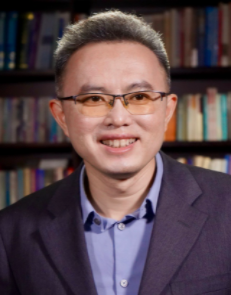
Tang Yao, Associate Professor at Peking University, Guanghua School of Management
Dr. Tang is an Associate Professor at the Department of Applied Economics, Guanghua School of Management, Peking University. He is also a researcher at the CITIC Foundation for Reform and Development. He graduated with a PhD in Economics from the University of British Columbia in 2009, and taught at Bowdoin College in the US from 2009 to 2016, where he was an Assistant Professor and Associate Professor. His main research fields are monetary economics, international economics and corporate strategy. His courses include Principles of Macroeconomics, Macroeconomics and Policy, International Finance, International Trade, Economic Growth, Topics in Asian Economies and Principles of Microeconomics.

Thomas Coleman, Senior Lecturer, Harris School of Public Policy, University of Chicago
He was formerly Executive Director and Senior Advisor at the Baker Friedman Institute of Economics at the University of Chicago. Before returning to the University of Chicago, Coleman was a veteran of the financial markets for over twenty years, the positions including but not limited to: Head of Quantitative Analysis and Risk Control at Moore Capital Management, LLC; Director and founding member of London-based hedge fund manager Aequilibrium Investments, Ltd.; Sell-side roles in fixed income derivatives research and trading at TMG Financial Products, London, Lehman Brothers and S.G. Warburg. Author of: Quantitative Risk Management and A Practical Guide to Risk Management.
Coleman was an academic, teaching graduate and undergraduate economics and finance at the State University of New York at Stony Brook. Coleman earned his PhD in economics from the University of Chicago, and his BA in physics from Harvard.
Course Content
-The structure and effectiveness of modern national monetary systems
-The role of central banks and commercial banks in the country
-Monetary policy making and its impact on national interest rates and foreign exchange rates
-The role of central banks as lenders of last resort in times of financial stress
-Banking Regulation and Innovation in China
-Career planning and social networking by top professionals in finance in the US and China
Course Highlights
-Three-week offline courses with professors from both universities teaching face-to-face at Peking University
-Theoretical foundation and practical sharing in the field of currency and international finance
-Career planning advice and social networking from top practitioners in finance from China and the US
-Certificate of completion jointly awarded by Peking University and the Harris School of Public Policy at the University of Chicago
Course Fees
-Regular fee: US$3,000
-Early bird rate: $2,700 (Applications due by April 18)
-Discounted rate for current students and alumni of Peking University or the University of Chicago: $2,500
About the Course Details:
https://info.harris.uchicago.edu/monetary-policy-international-finance/program-details
Course III: Environmental Economics and Policy Lab, EEPL
Duration:7 August 2023 - 25 August 2023
The Environmental Economics and Policy Lab (EEPL) is a course for undergraduate, postgraduate students and professionals interested in the field of environmental economics and energy policy. The course is taught face-to-face by professors of the University of Chicago at Peking University with field trips and exchanges in Beijing. The course will provide a broad exploration of the theory and application of environmental economics, introduce the topic of energy policy in the context of environmental policy issues in the world today, explore the translation into microeconomic theory issues and highlight the decision constraints and fundamental trade-offs faced by policymakers.
Faculty:
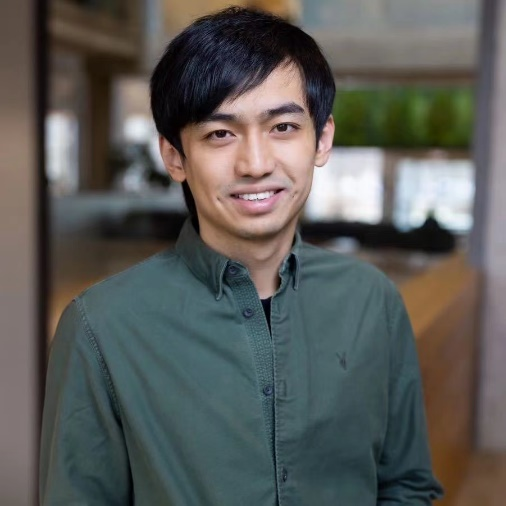
Shaoda Wang, Assistant Professor, Harris School of Public Policy, University of Chicago
Dr. Shaoda Wang currently serves as a National Bureau of Economic Research (NBER) Faculty Fellow and Academic Associate Director of the Energy and Environmental Policy Institute China Center (EPIC China) at the University of Chicago. He is an applied economist. His research fields include development economics, environmental economics and political economy, aiming to understand the political economy principles behind the public policy, with a focus on China. Dr. Shaoda Wang holds a BA from Peking University and a PhD from the University of California, Berkeley.
Course Content:
-Theoretical Foundations of Environmental Economics
-Sharing Environmental Energy Policy in Practice
-Understanding and addressing environmental and energy issues in the context of development economic theory
-Writing policy reports and participating in group discussions
Course Highlights
-Three-week offline courses delivered face-to-face at Peking University
-Cutting-edge academic sharing from leading scholars in environmental policy research in -China and the US to expand professional knowledge and industry networks
-Field trips and visits to energy and environmental organizations
-Certificate of completion jointly awarded by Peking University and the Harris School of Public Policy at the University of Chicago
Course Fees
-Regular fee: US$3,000
-Early bird rate: $2700 (Applications due by 18 April)
-Discounted rate for current students and alumni of Peking University or the University of Chicago: $2,500
About the Course Details:
https://info.harris.uchicago.edu/environmental-economics-policy-lab/program-details
How to Apply
All of the above programmes are open to participants from various professional and academic backgrounds. Current undergraduate students (who need to have completed at least one year of undergraduate study at a full-time university by summer 2023), postgraduate students and working professionals are all welcome in this programme. Applicants are required to submit the following application materials via the online system.
1) Completed online application
2) Statement of motivation (300 words)
3) Curriculum vitae
4) Transcripts
5) English Language Requirement (TOEFL/IELTS/DUOLINGO/CET4-6)
Application Period
Early bird application deadline: 18 April 2023 (Early bird rates available for applications before this date)
First round application deadline: 23 May 2023
Second round application deadline: 18 June 2023
* Applicants will be notified of their acceptance or non-acceptance within approximately two weeks of the closing date for each round of applications.
* If the intake is full, applications will be closed before the second round.
* Foreign students must have a valid study visa to participate in the programme. For applicants who need to apply for a visa to travel to China, please take the time length of your visa application into account and schedule your application properly.
We look forward to seeing you in the summer of 2023!
Explore cutting-edge fields with leading teachers and scholars from both universities.
Upgrade to a higher version of yourself!
Scan the QR code below to join the programme information group and speak directly to admissions officers:
If you have any questions, please send an email to:
harriscredential@uchicago.edu(芝加哥大学)
pkuucsummer@pku.edu.cn(北京大学)
Source: PKU News